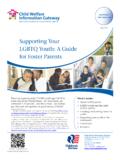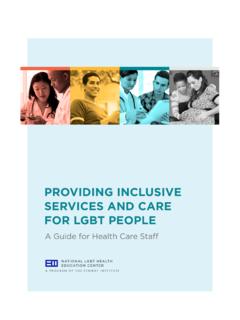Transcription of LESBIAN GAY LESBIAN BISEXUAL TRANSGENDER …
1 1 EQUALITY DIGNITY FREEDOMLESBIANGAYBIS EXUAL TR ANSGENDER INTERSEXEQUALITY DIGNITY FREEDOMLESBIANGAYBIS EXUAL TR ANSGENDER INTERSEXN atioNal iNterveNtioN Strategy for LESBIAN , gay, BISEXUAL , TRANSGENDER aNd intersex (lgbti) SectorEQUALITY DIGNITY FREEDOMLESBIANGAYBIS EXUAL TR ANSGENDER INTERSEXN ational Intervention Strategy for LESBIAN , Gay, BISEXUAL , TRANSGENDER and intersex (LGBTI) SectorTable Of The NaTIONaL TaSk Team ON GeNder aNd SexuaL OrIeNTaTION-BaSed VIOLeNCe Purpose of the NTT Objectives addreSSING GapS IN The CrImINaL juSTICe SySTem 22. ImpLemeNTaTION TerraIN Composition of the NTT Implementation Proposals 83.
2 The NIS FramewOrk Vision of the NTT Aims Strategic Outputs 9 EQUALITY DIGNITY FREEDOMLESBIANGAYBIS EXUAL TR ANSGENDER INTERSEX11. BackgroundSouth Africa s post-apartheid Constitution 1 was the first in the world to outlaw discrimination based on sexual orientation, and South Africa was the fifth country in the world, and the first in Africa, to legalise same-sex rights of LGBTI South africans are clearly stated in Chapter 2 of the Bill of rights, Section 9(3): The state may not unfairly discriminate directly or indirectly against anyone on one or more grounds including race, gender, sex, pregnancy, marital status, ethnic or social origin, colour, sexual orientation, age, disability, religion, conscience, belief, culture, language and birth.
3 Likewise, in Chapter 2 of the Bill of rights 9(3): No person may unfairly discriminate directly or indirectly against anyone on one or more grounds in terms of subsection (3). This firmly places South Africa at the forefront of countries globally in terms of adopting a comprehensive human rights approach to same-sex, or LGBTI-related rights. However, there is a gap between the Constitutional rights and protections for LGBTI persons, and the actual realisation of these rights, and this sets the tone for this strategic framework. With the spate of targeted attacks and murders of black lesbians in certain townships in South Africa continuing unabated, and following considerable pressure from various stakeholders, the Department of Justice and Constitutional Development (DoJ&CD) took a number of steps to respond to the problem. These steps are briefly outlined The NaTIONaL TaSk Team ON GeNder aNd SexuaL OrIeNTaTION-BaSed VIOLeNCeIn March 2011, the Minister of Justice and Constitutional Development mandated the establishment of a National Task Team (NTT) to develop a National Intervention Strategy that will address corrective rape.
4 The department initiated engagements with key government departments and institutions to develop the National Task Team. The NTT is constituted by government departments, chapter nine institutions and civil society organisations that specialise in issues related to LGBTI persons. The work of the NTT is guided by the South African Constitution, which guarantees equality and prohibits discrimination on many grounds, including gender, sex and sexual orientation. purpose of the NTT The purpose of the NTT is to develop a national intervention strategy to address gender and sexual orientation-based violence against LGBTI persons, especially in the criminal justice system. The intervention strategy will use an intersectional approach which could include, but is not limited to addressing unfair discrimination on the basis of gender; sex, sexual orientation; race, ethnicity or social origin, colour, age, disability, culture, language; age, conscience, belief and other related grounds enlisted in section 9 (3) of the See Section 9(3) of the Bill of Rights in the South African Constitution, referred to as the equality clause.
5 The clause affirms the rights to non-discrimination and equality on the basis of sexual orientation and gender respectively, amongst other Objectiveso Develop the National Intervention Strategy to respond to and prevent sex- and gender-based violent crimes perpetrated against LGBTI Develop the Intersectoral Implementation Plan for the Strategy which would link parallel and complementary initiatives, internal and external to the DoJ&CD such as the concurrent development of a Hate Crimes Bill and Policy Framework, and other related Strengthen government s ability to respond to the needs and specific vulnerability of LGBTI persons and strengthen the capacity of civil society organisations (CSOs) to deliver related Improve linkages with other government departments, programmes within the DoJ&CD such as the Access to Justice and the Promotion of Constitutional Rights programme, the National Action Plan (NAP)
6 To Combat Racism, Racial Discrimination, Xenophobia and Related Intolerance and related programmes, as well as relevant Chapter 9 institutions such as the South African Human Rights Commission, the Commission for Gender Equality and the Commission for the Promotion of the Rights of Cultural, Religious and Linguistic Communities, in that manner address the impact of multiple and intersecting forms of discrimination targeting LGBTI Improve the management of cases by relevant role players in the criminal justice system including South African Police Services, National Prosecuting Authority, Department of Social Development, Department of Health and Correctional Services. o Implement, coordinate, monitor and evaluate the National Intervention Strategy and related addreSSING GapS IN The CrImINaL juSTICe SySTemThe DoJ&CD s Chief Directorate: Promotion of the Rights of Vulnerable Groups, commissioned a situational analysis on the management of LGBTI cases in a sample of courts in 2011.
7 The report stemming from this analysis highlighted existing gaps in the criminal justice system as well as in the broader JCPS cluster with regards to access to justice and protecting the rights of LGBTI persons. In addition, the study also developed a tool, based on past cases, to assist with capturing victims experiences of the criminal justice system. In 2012 the DoJ&CD transferred the LGBTI Rights programme from the Chief Directorate: Promotion of the Rights of Vulnerable Groups to the Chief Directorate: Constitutional Development. In 2013 the DoJ&CD, Chief Directorate: Constitutional Development, through the NTT, commissioned a National Intervention Strategy On Gender And Sexual Orientation-Based Violence perpetrated against LESBIAN , Gay, BISEXUAL , TRANSGENDER And intersex (LGBTI) Persons. For purposes of inclusivity of intersex and TRANSGENDER identities, this title has been revised to National Intervention Strategy On Sex- and Gender-Based Violence perpetrated against LESBIAN , Gay, BISEXUAL , TRANSGENDER And intersex (LGBTI) 5 July 2013, the Working Group of the NTT established a Rapid Response Team comprised of representatives of the Department of Justice and Constitutional Development, National Prosecuting Authority, South African Police Service and civil society organisations.
8 The purpose of the Rapid Response Team is to urgently attend to the pending cases in the criminal justice system where crimes have been committed against LGBTI persons. Following a number of deliberations with stakeholders, the NTT resolved that the scope of the national intervention strategy on gender and sexual orientation-based violence perpetrated against LGBTI persons should be extended beyond a response to corrective rape to address gender and sexual orientation -based violence against LGBTI persons in general, as well as access to justice for LGBTI persons. The rationale at the time was to include TRANSGENDER (a matter of gender identity rather than sexual orientation) and intersex (a matter of biological / anatomical sexual 3characteristics rather than sexual orientation) in the reference to gender based violence. Furthermore, the term gender and sexual orientation based violence is proposed to reflect the complexity of the LGBTI spectrum.
9 It is also formulated to move us away from the term corrective rape and to incorporate the fact that males, females, TRANSGENDER persons and intersex persons are victims of violence that include, but is not restricted to rape. The NTT also resolved that the new strategy should be inclusive of medium- and long-term objectives, including planning documents produced by the Working Group of the the doj&Cd Situational analysis report, the context for violent crime that targets LGBTI persons is sketched as follows:2In spite of this enabling legal environment, the lived reality for many LGBTI persons is quite a different story. On the most extreme end of a wide spectrum of discriminatory experiences, there are frequent reports of extreme violence inflicted on young, black, LESBIAN women in the form of so-called corrective rape, often ending in murder. Gay men and TRANSGENDER persons are also often targets of physical violence, and labour discrimination and exposure to derogatory and threatening speech is also common.
10 Finally, deprioritisation, marginalisation, exclusion and targeted victimisation by those public institutions intended to provide services and protection are everyday realities for LGBTI persons in many communities, leading to a lack of resources when crimes are committed and resulting in victims fear to even report crimes. 2. ImpLemeNTaTION Composition of the NTTThe NTT is chaired by the Director General of Justice and Constitutional Development, and co-chaired by a representative from civil society. 2 The Situational Analysis of LGBTI in the Courts (DoJ&CD, 2011)Service providersNTTworking Group: doj& Cd, SapS, Npa, Triangle project, OuT, Few, GaLa,Gender dynamix, Fhr, SahrC & CGedoj&Cd as lead department4 The NTT is constituted by Government Departments and Institutions that participate in crime intervention, including CSOs that specialise in issues related to LGBTI persons and communities.

















